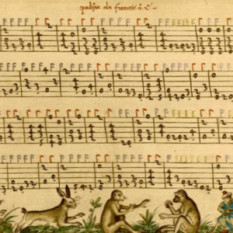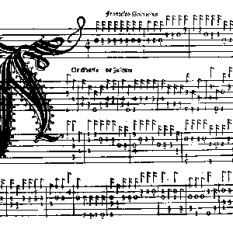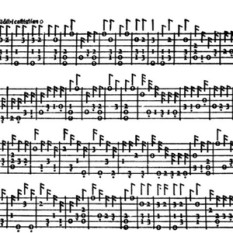Vincenzo Galilei (c. 1520 – July 2, 1591) was an Italian lutenist, composer, and music theorist, and the father of the famous astronomer and physicist Galileo Galilei. He was a seminal figure in the musical life of the late Renaissance, and contributed significantly to the musical revolution which demarcates the beginning of the Baroque era.
He was born around 1520 in Santa Maria a Monte (Tuscany), and began studying the lute at an early age. Sometime before 1562 he moved to Pisa, where he married into a noble family. In 1564 Galileo was born, the first of his either six or seven children; another son, Michelagnolo, born in 1575, also turned out to be an accomplished lutenist.
Vincenzo was a skilled player of the lute, and early in life attracted the attention of powerful, well-connected patrons. In 1563 he met Gioseffo Zarlino, the most important music theorist of the sixteenth century, in Venice, and began studying with him. Somewhat later he became interested in the attempts to revive ancient Greek music and drama, by way of his association with the Florentine Camerata (a group of poets, musicians and intellectuals led by Count Giovanni de' Bardi) as well as his contacts with Girolamo Mei, the foremost scholar of the time of ancient Greek music. Sometime in the 1570s his interests in music theory, as well as his composition, began to move in this direction. Some of Galilei's most important theoretical contributions involve the treatment of dissonance: he had a largely modern conception, allowing passing dissonance "if the voices flow smoothly" as well as on-the-beat dissonance, such as suspensions, which he called "essential dissonance." This describes Baroque practice, especially as he defines rules for resolution of suspensions by a preliminary leap away followed by a return to the expected note of resolution.
In addition, he made some substantial discoveries in acoustics, particularly involving the physics of vibrating strings and columns of air. It is possible that in establishing the relation between the tension on a string and its frequency of vibration he was the first to discover a non-linear physical law. But at the time, the expression of what we now call "physical laws" was the key issue. If Vincenzo made this discovery and expressed it using the language of mathematics, this would be an important generalization of the long-understood discovery of the pythagoreans that whole numbers (mathematics) determine harmonic scales. And if all musical relationships and physical measurements in instruments could be mathematically defined, then his son Galileo's insight that all physical relationships of any type can be mathematically defined, follows as a more natural step.
The use of recitative in opera is widely attributed to Galilei, since he was one of the inventors of monody, the musical style closest to recitative.
Galilei composed two books of madrigals, as well as music for lute, and a considerable quantity of music for voice and lute; this latter category is considered to be his most important contribution as it anticipated in many ways the style of the early Baroque. Many scholars credit him with directing the activity of his son away from pure, abstract mathematics and towards experimentation using mathematical quantitative description of the results – a direction which was of utmost importance for the history of science.
.
You can find information through the best music search engine - Muzlan.top 😊All materials on request "Vincenzo Galilei" are available on page Vincenzo Galilei
Yes of course. You can listen tracks on the page Vincenzo Galilei
Yes of course. You can download tracks on the page Vincenzo Galilei
This page is found by queries: Vincenzo Galilei remix, Vincenzo Galilei songs download, Vincenzo Galilei flac, Vincenzo Galilei all mp3, Vincenzo Galilei song download



